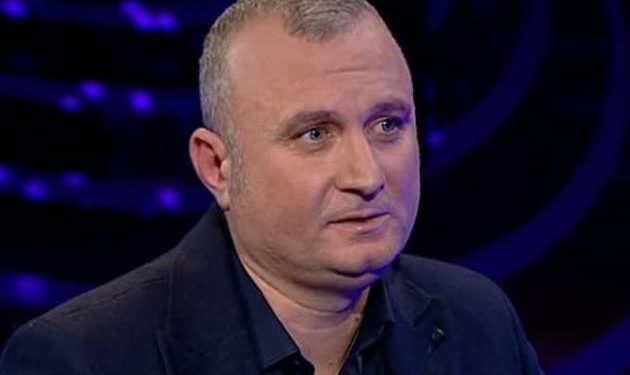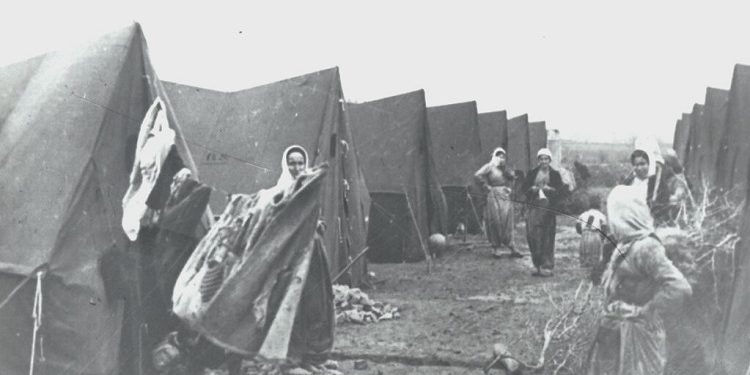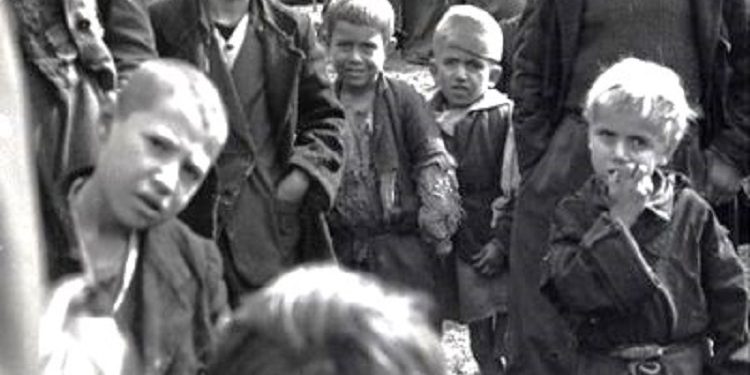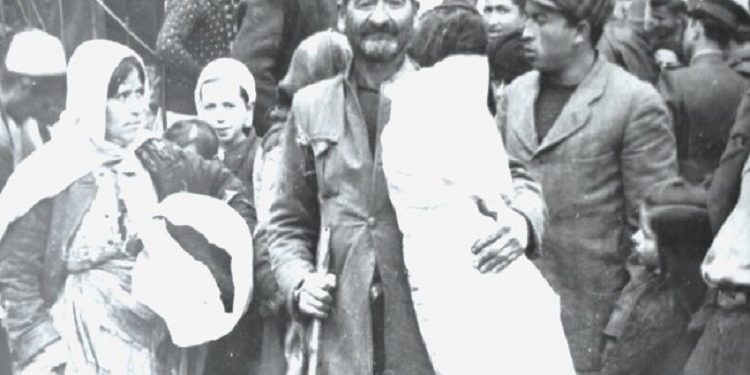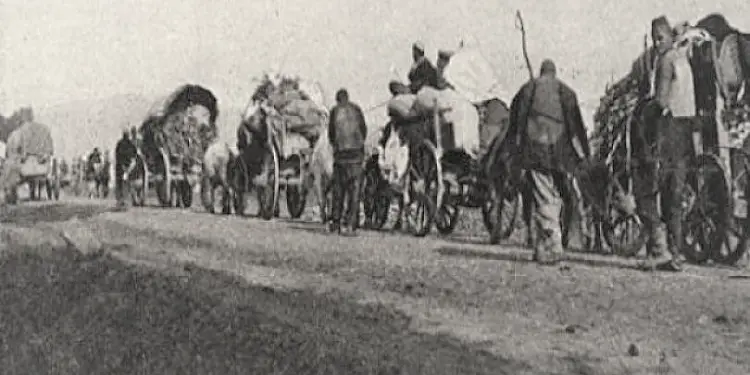Memorie.al / The Balkans, and Albania as an integral part of them, have a history full of zigzags and interweaving’s. The massive movements and displacements of their populations from one country to another are also a part of it. The Arvanites of Greece, or otherwise the Arbëreshë of Greece, and on the other hand, the Greeks or minorities, as we know them in Albania, are also a piece of this history. As for the former, we know (at least after the nineties) some distinguished figures such as the president of the Arvanites of Greece, the prominent scholar Aristidh Kola and his tragic fate.
But our attention was drawn to a material in German by a genuine scholar of the issues of our region, who has been attested and recommended as a good and impartial connoisseur of the problems of these areas (Dr. Konrad Clewing) on the Albanians and Albanian speakers of Greece, and also on the Greeks of Albania. He tries to present their history and situation on both sides of the border with objectivity and in a concise manner.
We will try to stick to the main issues that the German professor has addressed, referring to the essence and the message he wanted to leave in this study. The material, to be more precise, is taken from the magazine “Pogrom-Threatened Peoples,” no. 2/2001, by Dr. Konrad Clewing, a specialist in Albanian issues at the Institute for Southeast Europe in Munich.
Let’s see what the German professor finds in his study. The parts of the Albanian-speaking population in Greece, divided by history, language, and national consciousness, do not form a unique group. For this reason, their designation in Greek as “Arvanites” is somewhat irritating to them. International science defines them as Arvanites, as the only members of the community of descendants of immigrants from the areas of Southern Albania.
The first and significant wave of their emigration occurred at the invitation of local princes and lords, starting from the 13th century, then in the 14th century, and continued until the 15th century. Since then, the Arvanites settled in about 300 places and areas in the south of Greece; thus they settled in Attica (the surroundings of Athens) in the east, in some of the Aegean islands (among others, in Euboea, Hydra) and in the Peloponnese.
The Tendency of “Arbërorë” Assimilation
In the beginning, they preferred to be designated by an ethnonym, a common name for all, and to be called “Arbërorë.” The language is also said to have originated from this word, “Arbërisht.” Most of them, over time, also adapted to the Greek designation to define their linguistic origin, that is, (Arvanitika-Arbërisht). The number of Arvanites, according to the criteria of linguistic use or self-determination, according to consciousness, today reaches 150,000-200,000 people.
However, “Arvanitika” or “Arbërisht” is not only very strongly fragmented into dialects, but its speakers, meanwhile, are all bilingual with a growing tendency to lose it definitively in subsequent generations. The fact that Arvanite culture has been completely rural has influenced linguistic assimilation. Just like Greek society in general, they have long been oriented towards urban areas, referring to or, rather, moving away from the “Arvanito-Greek” model of life.
Urbanization, migration, and social movement have continuously influenced the loss of their language and dialect, and along with it, the change or loss of identity. Even Arvanites who are aware of their origin now see themselves as half-Greek and half-Arvanite, that is, a political-ethnic identity does not exist. The other more nationalist Greek part propagates that you can be both Greek and Arvanite at the same time.
The neglect of the Arvanite language and its culture, as well as the disregard for centuries and decades in all aspects, by all state and religious institutions, that is, by the Greek church (to which the Arvanites themselves belong) of this ethno-linguistic group, shows that in essence, the “agreement” will be accepted as long as the remaining Arvanite language is understood as a transitional phase towards full assimilation by the Greek-speaking world. This and the hostile environment towards Albanians in Greece after the 90s have led to Arvanite clubs and groups now orienting themselves more towards the idea of “Albanianism.” Arvanite clubs and groups were created from the late 70s.
The Reawakening of Albanian Ethnic Consciousness
A second, smaller group of Albanian speakers consists of the inhabitants of some areas and villages in the border area between Greece, Bulgaria, and Turkey, or, in other words, Thrace. They are the last remnants of a large population displacement during the years 1922-23, which were concentrated mostly in this border triangle and whose speech resembles that of the groups who arrived in the 16th century.
From the beginning of the 20th century, some representatives of the Albanian national movement also came here, while today in the Greek part of it, the Albanian language has been preserved among the youth; in the consciousness of being “Arvanite,” but also Greek. A third group of Albanian speakers today is only partial: these are the Chams (Greek, tsamides) in a rugged area on the border with Albania, in northern Greece, that extends to the shores of Epirus.
Unlike the other two groups, they, both historically and linguistically, are part of a closed and compact Albanian-speaking area; they had, that is, they have an Albanian national ethnic consciousness. For example, among them, the Albanian language is called Albanian, just like in Albania. When the minority was created, its two parts, the Muslim half and the Orthodox half, through the establishment of borders in 1913, the Muslim part was officially excluded from the exchange between the Turkish and Greek populations, but, in fact, this Muslim population was discriminated against.
As a result of alleged cooperation with Italian and German forces, and with the establishment of Albanian officials in the occupied areas during World War II, about 20,000 Muslim Albanians who remained in 1944 were massively expelled by Greek troops towards Albania. The remaining Christian Chams are not recognized as such by Greek legislation and the Constitution. They are very little studied, but they seem to have an increasingly national consciousness and master their language; they stand under great and continuous pressure from the Greek state.
But they do not manage to be officially declared. In general, the Greek state has not supported studies on Albanian-speaking groups and has not recognized them, but it has accepted their special cultural identity. In some Muslim Cham areas, only from 1936 to 1939, were some “half-hearted” attempts made: to offer teaching in the mother tongue. To this day, Greece, therefore, due to its inadequate policy towards minorities, has not contributed to overcoming problems and understanding in Southeast Europe.
The Other Side of the Coin: The Greek Minority in Albania
The Greek minority in Albania and the Albanian one in northwestern Greece are generally studied based on nationalist colors. In fact, both of these minority groups are the result of the same phenomenon: in the wake of the Balkan wars of 1912-13, new borders were established in the areas that until then were under the rule of the Ottoman Empire. From here, a Greek minority group was born in the south of Albania, which today extends to a relatively compact area (south of Gjirokastër), partially mixed with the Albanian population (in the neighboring coastal areas of the city of Sarandë).
Through internal migration, the Greek minorities also came to the city of Gjirokastër, other cities, and the capital. Here we must keep in mind that we are generally talking about members of the minority with an above-average level of education, which are very important for the representation of their interests.
Even during the communist regime in Albania, the minority areas were clearly defined. They included, excluding Himara, the entire Greek-speaking minority region. The protection of the minority at that time was limited, however, only to the rudimentary preservation of their mother tongue and education. Schools of higher levels for teaching in the Greek language were established only after the nineties.
The Greek “Game” with Numbers
But how many Greeks are there in Albania? During the period between the two world wars, the largest number of them is counted, a number derived from the archives of the League of Nations Organization. This figure varies from 35,000-40,000 Greeks. The last population census in Albania during the time of monism, that of 1989, came up with a number of 58,758 Greeks, while the Greek government, however, does not have a precise number that it claims, but the number often publicly claimed in Greek society and media is 300,000-350,000 minority Greeks in Albania. Both statistics are an expression of ethnopolitical thought.
According to the election results of 1992, especially of the Human Rights Party, then Omonia, the number (even before the great wave of emigration and mass departure of Albanians for economic reasons to Greece occurred) is determined to be the safest at 100,000-120,000 people. The registration of the number of 300,000-350,000 also includes a large part of Orthodox Albanians and the Aromanian community or minority.
This almost expansive notion is also used by the political representatives of the Greek minority in Albania, contributing essentially to the concern of Albanians about the artificial increase of the Greek minority there and the impact on relations with Greece. The possible consequences of all this are ethno-national polarizations, as in the local elections in the municipalities of the Himara area, in the autumn of 2000. It is a pity, meanwhile, that the organizations of the Greek minority in Albania called for a boycott of the population census in April 2001. The debate on the final determination of the number of the minority is also for its own members and representatives: one of the heaviest burdens and challenges.
Theodoros Pangallos: The Arvanite Language Should Not Disappear!
After 17 years of studies, research, and travels through the areas of Epirus, Florina, Konitsa, Thrace, Corinth, Attica, and Boeotia, where the Arbërorë (Arvanites) live and their songs are sung in Greece, the writer, musician, and singer Thanasis Moraitis has brought an anthology with great scientific, historical, linguistic, and musical values, which contains over 140 musical materials written with transcribed texts in Greek and translated into Albanian. In this presentation at the beginning of 2003, the Greek politician Theodoros Pangallos also spoke, who among other things said that; “For us who were born in houses where our grandmother spoke ‘Arvanitika,’ this language, which is not as we hear some ‘carnations’ say, Greek with some other words, but is Albanian, the pure Albanian of the 14th century.”
This is also confirmed by today’s Albanian immigrants who are in Missolonghi and who tell us: “You speak the old Albanian.” This is very logical from a linguistic point of view, since the language of the Albanians who settled here in the 14th century saw their language evolve into Greek, and what came down to our days was the old idiom of Albanian. For us, the loss of the Arvanite language is like having lost the homeland, because it contains a culture not under conditions of oppression, because no one could oppress the Arvanites in Greece: they led Greece, they were generals, prime ministers, presidents, and owners of the capital, but they themselves ‘swallowed’ their past, because they were fanatically convinced that they were Greeks.
With the help of teachers, they managed to make the Arvanite language disappears, which no one speaks today, at least, from my age and below. Now, thank God, we still have some grandfathers and grandmothers who speak it. However, it is a pity for this language to be lost, and I believe that the work done by Thanasis Moraitis helps so that Arvanitia is not a lost homeland. The language, culture, customs, and traditions must come to light, because otherwise, if it remains in darkness, it will truly be a lost homeland.” “Don’t think you can wipe out the Arvanites. Greece without Arvanites and Arvanites without Greece cannot be,” said Aristidh Kola.
CD with Arvanite Songs
These last 15 years, thanks to the will and ambition of the Arvanite scholar Aristidh Kola, Dhimitri Leka and the singer Thanasis Moraitis, it has been possible to produce the first two CDs with Arvanite songs titled “Këngët arvanitase” (Arvanite Songs) and “Trëndafilat e malit” (The Roses of the Mountain), which are a compilation of some Arbëreshë songs from Southern Italy and Arvanite songs from Greece. These two CDs are the only ones produced in the all-Albanian history in the Arbëreshë language. / Memorie.al




